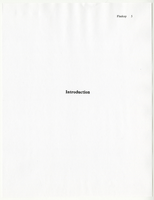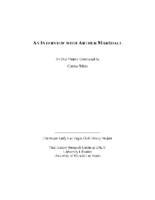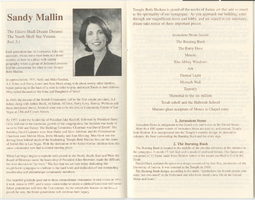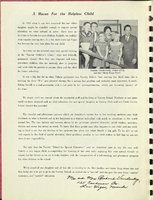Search the Special Collections and Archives Portal
Search Results

Transcript of interview with Gerald Gordon by Barbara Tabach, November 02, 2016
Date
Archival Collection
Description
In 1961, at the age of thirteen, Gerald ?Jerry? Gordon became a bar mitzvah. This typical coming of age celebration was unusual in that he had simultaneously studied in both his home state of California and his adopted home of Las Vegas, where he spent summers with his grandparents. 1961 is also the same year that the Gordons made Las Vegas their permanent home. Jerry graduated from Las Vegas High School, attended University of Nevada, Las Vegas and earned his law degree from University of California, Los Angeles. His gregarious and trustworthy personality led him to career building steps in the legal community of Las Vegas that included illustrious names such as Louis Wiener, Jr., David Goldwater, Neil Galatz, and many others. His personal law specialty became bankruptcy, especially dealings with hotel/casinos. As a member of the Jewish community, Jerry?s energy and expertise to organize was instrumental in the construction of Congregation Ner Tamid, the reform synagogue, at its site on Valle Verde and I-215. It was a multi-year process and includes a vast array of stories?a cash donation from Moe Dalitz, finalization of receiving of a donation land from the Greenspun family during the High Holy Days, and the ongoing challenges of a building campaign during a recession. In addition, he explains that CNT included two unique negotiations: 1) a cell tower and 2) a solar field on the synagogue?s property. Jerry and his wife Yvonne met while attending UNLV. Yvonne taught math at various levels in the Clark County School District. They raised their two children, Sara and Jeffrey, in Las Vegas, and forged an important role together in Congregation Ner Tamid. In April 2017, they were among those honored for their work with the synagogue.
Text

Transcript from interview with Mike Unger by Barbara Tabach, January 21, 2016
Date
Archival Collection
Description
In this interview, Unger reflects upon his long and successful career in hotel management in Las Vegas and also in Arizona and Pennsylvania. He shares stories as a local celebrity, particularly in the 1970s and 1980s when he worked at Caesars Palace, as well as the big projects he oversaw, including organizing the first big fight nights, World Series of Tavern Poker and Grand Prix race. He talks about working with Morris Shenker, Moe Dalitz, Cliff Perlman and Billy Weinberger, and the role of the Jewish community in the city, and specifically in the gaming industry. Unger also discusses his non-gaming industry ventures which have included a satellite communications business and a bagel business.
Mike Unger was born in Queens, New York in 1947, and spent most of his childhood in Long Island, growing up in a predominantly Jewish and Italian community. As a young adult, Unger was already working hard, running one of his family?s restaurant after school. When he was in high school, his family moved to Los Angeles to accommodate his father?s health needs, and eventually end up in Las Vegas by 1967. Over the next two decades, Unger would work at nine properties in the city. Unger is one of the University of Nevada, Las Vegas? first hotel management graduates, and started his career with Summa Corporation in its management training program at the Frontier Hotel and Casino. After a brief stint at the Airport Marina Hotel in Los Angeles in 1972, Unger returned to Las Vegas, serving in management capacities at the Aladdin Hotel and Casino, Summa Corporation headquarters and Landmark Hotel and Casino. In 1978, he joined Caesars Palace Hotel and Casino management team, and was integral in creating the city?s first large boxing events, the World Series of Tavern Pool, and the Grand Prix race. Unger also ran properties for the White Mountain Apache and Colorado River Indian Tribes in Arizona, as well as the Showboat Hotel and Casino. In this interview, Unger reflects upon his long and successful career in hotel management in Las Vegas and also in Arizona and Pennsylvania. He shares stories as a local celebrity, particularly in the 1970s and 1980s when he worked at Caesars Palace, as well as the big projects he oversaw, including organizing the first big fight nights, World Series of Tavern Poker and Grand Prix race. He talks about working with Morris Shenker, Moe Dalitz, Cliff Perlman and Billy Weinberger, and the role of the Jewish community in the city, and specifically in the gaming industry. Unger also discusses his non-gaming industry ventures which have included a satellite communications business and a bagel business.
Text
Transcript of bus tour of "Jewish Las Vegas" by Temple Beth Sholom, May 17, 2015
Date
Archival Collection
Description
Temple Beth Sholom organized and led a bus tour of parts of Las Vegas that are significant in local Jewish history. Stops on the tour included Woodlawn Cemetery and the former Temple Beth Sholom campus on Oakey Boulevard. Narrator Arlene Blut gives the overview of the Jewish community, and Rabbi Felipe Goodman talks to tour participants at the cemetery. Former Las Vegas mayor Oscar Goodman speaks at the old synagogue along with Josh Abbey, whose mother created the stained glass windows at the temple.
Text

Transcript of interview with Rabbi Mel Hecht by Barbara Tabach, March 17, 2016
Date
Archival Collection
Description
In this interview, Hecht talks his life experiences leading him to becoming a rabbi, eventually being a spiritual leader in Las Vegas. He discusses his experiences at Ner Tamid as well as the joy of starting Temple Beth Am, with the support of Morris and Lillian Shenker. Hecht shares stories about working with unions and Ralph Engelstad.
In 1939, Rabbi Mel Hecht was born in Detroit, Michigan. At the age of five, his family moved to Miami, Florida where they had a large, extended Jewish family, complete with relatives who were hazzans and mohels. Soon after moving to Florida, his parents bought a hotel in Hialeah, about 10 miles outside of the city, where Hecht spent the remainder of his childhood. Hecht attended the University of Miami where he earned a Ph.D. in Divinity, and subsequently attended the Hebrew University of Jerusalem. In 1971, he became a rabbi upon graduating from seminary in Cincinnati, Ohio. Three years later, Hecht joined the U.S. Army and served as a race relations officer in Germany. After his service, Hecht returned to Florida (Fort Pierce) to lead his own congregation, and in 1980, he moved to Las Vegas and became the congregational rabbi for Congregation Ner Tamid. Two years later, he left Ner Tamid to start a new congregation?Temple Beth Am?which grew swiftly. In 1982, Hecht also married Michelle (?Micki?). The couple have three children: Melissa Hecht, Karin Toti, and Adam Hecht.
Text

Jews Wandering in the Desert: A History of the Jewish Community of Las Vegas by Joel Fleekop, May 1, 2000
Date
Archival Collection
Description
Joel Fleekop's senior honors thesis from Brandeis University titled: "Jews Wandering in the Desert: A History of the Jewish Community of Las Vegas."
Text

Transcript of interview with Arthur "Art" Marshall by Claytee D. White, February 11, 2014
Date
Archival Collection
Description
Interview with Arthur "Art" Marshall by Claytee White on February 11, 2014. In this interview, Marshall
Arthur Marshall was born in 1929 in Cleveland, Ohio. He met his wife, Jayn in 1953, and the couple moved to Las Vegas where she already lived with her family. Art joined his father-in-law in the family's retail clothing business. Art Marshall took over the retail clothing business with his brother-in-law, Herb Rousso, and expanded operations as Marshall-Rousso stores. Art quickly became very active in the Jewish community upon arriving in Las Vegas. He served as president at Temple Beth Sholom, and worked with other Jews in the city, many who owned and managed the hotels at the time, to build a strong Jewish community in Las Vegas. He served as the chairman of Nevada State Bank and spent 12 years on the Nevada Gaming Commission.
Text

Transcript of interview with Walter Weiss by Claytee White, November 2, 2010
Date
Archival Collection
Description
In this interview, Walter Weiss discusses how Judaism and boxing kept him out of trouble in his youth. Weiss grew up in the Boston area, and started boxing as a teenager. Weiss talks about his boxing training, becoming a runner for a bookmaker, and coming to Las Vegas in the 1950s to be a bookmaker for the Stardust Hotel, and working the slot machine floor. He had several different jobs in various casinos, and discusses different people involved in the gaming industry in Las Vegas.
Walter Weiss life story begins in a Malden, Massachusetts during the Great Depression. His early background was a blend of observant Judaism, secularism, and the effects of the era. He was a troubled youth whose older brother encouraged him to join him in boxing. As Walter explains: I was a wild kid and ... boxing saved my life. His aptitude for boxing led him to be a sparring partner in New York City's famous Spillman Gym. There he met and worked out with some of the greatest fighters of the era, including Rocky Marciano. He recalls how he turned professional while attending the University of Miami and how he first came to Las Vegas in 1958 to escape his personal troubles and find work with a local bookmaker. Thus began his diverse employment history in the casino industry. He details his various positions and the cast of famous and infamous characters of the times. For six years he return to New York and worked as a Wall Street broker before arriving back in Las Vegas in 1973. He talks about his property ownership, lobbying for an amendment to Senate Bill 208, his personal religious changes and a sundry of observations about the changes that occurred as the state took over gaming.
Text

Invitation and program for Temple Beth Sholom building dedication, September 2000
Date
Archival Collection
Description
Temple Beth Sholom invitation and program for the building dedication includes a guide to the Judaic art in the synagogue and a list of past presidents.
Text

Book, The Marshall Plan, by Jack Sheehan, 2013
Date
Description
Art Marshall is one of the founders of the Marshall-Rousso chain of women's dress shops that started in casinos in Las Vegas. He is also a banker, a member of the Nevada Gaming Commission, is active in the Anti-Defamation League and the Jewish Federation of Las Vegas, is an art collector, and is a philanthopist, especially for Jewish faith-based causes and for the University of Nevada, Las Vegas.
Text

Program for Gay 90s Revue by Variety Club Number 39, November 1960
Date
Archival Collection
Description
This program has fundraising advertisements from community members, celebrities and performers in Las Vegas who supported the event that benefited the Variety Club.
Text
